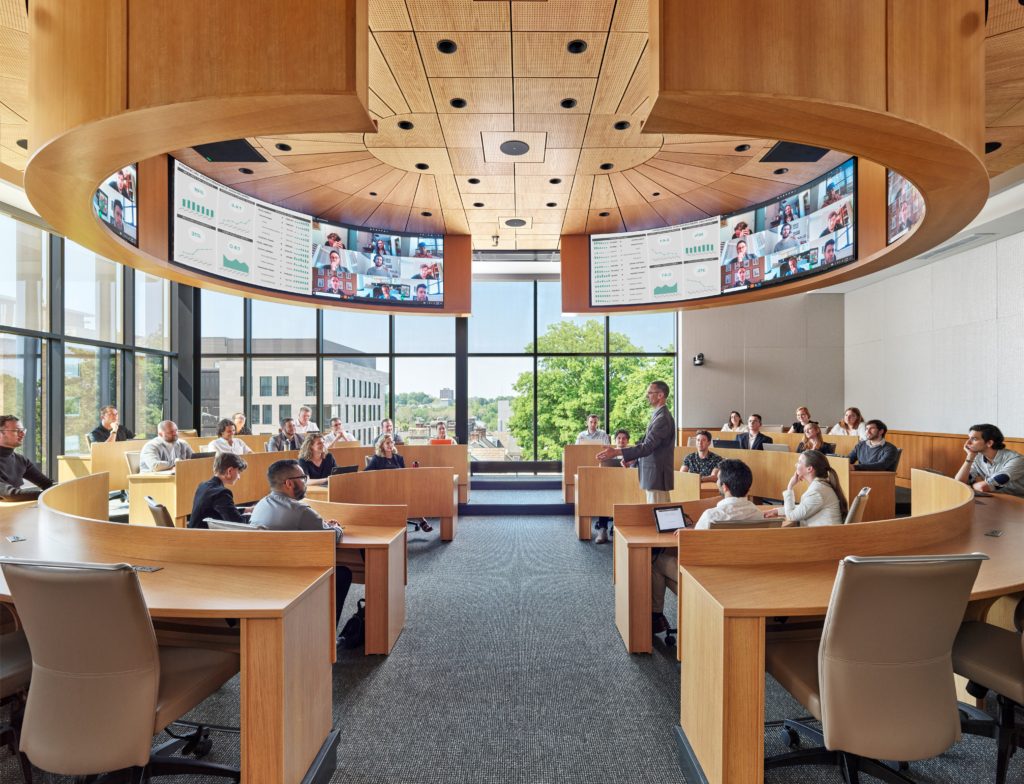
Lehigh students in Novena Koukova’s marketing strategy course. Courtesy photo
And what about undergraduate programs? How have those changed during your tenure?
We completely revamped the undergraduate program. That curriculum hadn’t been changed since forever. Nobody really sat down and asked, “What do we need our undergraduates to come out with?”
I told the committee there is nothing sacred. I wanted them to really think about not what is but rather what can be. And they did a really good job, I’m very proud of that committee. They worked with the students, with the undergraduate program office, and with employers to identify the skills they’re looking for in our students.
We added a communications module because we kept hearing from employers that our graduates might be smart, but honestly, they can’t write an email.
We added a programming requirement. We are very proud that all of our students, no matter their major, have to take a programming class. They’re not becoming computer scientists, but they have to understand what computer science is. It will be interesting to see, with the advent of AI, what will happen in that arena.
We also tweaked inside of the curriculum. At Lehigh, we don’t have the luxury of saying “no” when employers say they need something else from our students. We say, “yes, of course we can.” For example, the banks interview students in the spring of their sophomore year for internships that will take place the summer after their junior year. We found with our very traditional curriculum that students weren’t getting into finance classes until the spring of their sophomore year. They were not competitive in interviews. So now we allow students to rejigger their curriculum, so that if they want to, they can take those classes earlier.
What do you think are the differentiators in the Lehigh undergraduate business program?
One of the big changes in higher education is that students can no longer wait until their junior year to think about an internship. We can rail against the pre-professionalism in higher ed, but our job is to put our students in the best position for success. And we also owe that to their parents because Lehigh is expensive.
So we start Day One. We have a great program called Student to Professional Program run out of the undergraduate office. We get students right when they first walk in the door, and we get them thinking about the kind of career they want to have. What appeals to them.
I like the program for many reasons, not the least of which is that for students that come in with a family background that is not in business, they’re kind of like a deer in the headlights. They may have never heard of a supply chain. So by starting them the first semester, first year in thinking about different career paths, they make better choices. We also have them working on LinkedIn from day one.
It’s skills building. So that when it’s time to get that internship, they are ready. For the undergraduates, career placement is a centralized unit through the university, and they’re wonderful.
EDITOR’S NOTE: A few days before our conversation with Dean Phillips, a major College of Business benefactor and supporter, Sanjay Shah, Lehigh MBA ‘89, died in an accident at an event celebrating the 25th anniversary of Vistex Asia Pacific. Shah founded Vistex, Inc., in 1999, and in 2019, his $5 million gift to Lehigh Business elevated the Vistex Institute for Executing Learning and Research.
And what about at the executive level?
My goal when I came was to build Lehigh out into a fully functioning, multi-tiered business school. The undergraduate program has always been a shining star. The part-time MBA program was very good, but it never led the way. Then, like I said, we started the full-time MBA program.
And then I said, we have to have exec ed. I mean, you can’t be a business school if you’re not teaching all levels of students, and executives are students.
Sanjay, who endowed our executive education center, was the kindest, sweetest man as well as a great, insightful business person. It was such a blow to us,
But, we have an extraordinarily talented executive director who pulled us through COVID, and I’m very proud of everything that’s been happening in both the open and custom programs we offer. But we’re going to be mourning Sanjay for a little bit longer.
Understandable, and I’m sorry to hear about Sanjay. On a more positive note, I know that Lehigh Business also opened a new building in March 2023. Tell me about the Business Innovation Building. What was the need?
Well, first of all, there was no space for executive education. You can’t do exec ed in an undergraduate classroom. At the same time, we were busting out of seems. So we started fundraising for the new building in fall of 2017, and we hit our fundraising goal in February 2020. We had to have 75% of pledges and cash, and it’s a $45 million building.
Then, two weeks after we got the go ahead to break ground, COVID. And in Pennsylvania, the governor stopped all construction. We tend to forget how scary those first couple of months were, but back then, we didn’t know what was going to happen.

Classroom in the Round in the new Business Innovation Building at Lehigh University. Courtesy photo
That must have been a sizeable delay.
It was. I remember a conversation with Sanjay, who was a great supporter of the building, and he said, “Georgette you have my money. Are you gonna build the building? Because if not, I’d kinda like my money back.” And he wasn’t the only one who said that.
I was putting out fires all summer. We got another green light in September 2020, but that was a hard summer.
But, it’s so worth it. The building is spectacular.
How so?
Well, the first thing is the technology. The world of hybrid is here to stay, and nothing is worse than being in a hybrid meeting or a hybrid class where you can’t hear people and they can’t hear you. The technology is top notch for hybrid.
We built a brand new financial services lab because finance is our largest major; we needed more finance teaching spaces. We built a new communications suite as well.
We have a number of faculty who are behavioral theorists. We built a new behavioral research lab which is heavily used by faculty from all different disciplines. The classrooms themselves all have movable desks. We have one traditional classroom, but all the others are meant for teaching in a different way, not for standing up and lecturing. And the third floor is all exec ed.
I did want to ask you about being Lehigh Business’ first woman dean and first African American dean. Diversity does get a lot of lip service these days, and certainly we write a lot about representation in leadership at Poets&Quants. I guess, why do you believe representation is important, and what does it mean for you personally?
Well, it’s important for the students – the whole idea of “if you can see it, you can be it.” I have had students approach me to say that they are so glad that I am dean.
I take mentorship very, very seriously. I benefited greatly from wonderful mentors, and I feel it’s my responsibility to turn that around. I can probably be a little bit harder on people. For example, when we were going through COVID, it was really hard, especially if you have kids and you were trying to juggle all that and work. But faculty who wanted to say they had it so hard, I had to say, “Hold on. Stop. The woman who is the checkout person at Walmart, who works 29 hours a week because if it’s 30 they would have to give her health care, and has to sew together several jobs in a place where people aren’t wearing masks, who doesn’t have live-in childcare, she’s working hard. Let’s reexamine our priorities here.”
Do you think your priorities as dean have changed over the last decade?
My true north is don’t lie. This is really important. You know, my backgrounds in real estate and real estate people aren’t really known for veracity. (Laughing)
What is next for you?
A lot of travel.
So, this sounds like a real retirement then.
My husband retired a couple of years ago, and he’s been waiting for me.
Quite frankly, I’ve been dean, but I don’t want to be a president. I call it the three F’s – food, football, and fraternities – and I really do not want to deal with it. I also don’t want to be dean anywhere else. I am perfectly comfortable traveling. My husband and I sing, and we’re going to be singing in Portugal.
Then this fall – because it’s the first fall in years where I haven’t been back in the classroom – we rented an RV. We’re driving from Glacier National Park down to the Grand Canyon with the two dogs.
What do you think is next for Lehigh’s College of Business? What will you be watching from afar?
Well, the one thing we didn’t talk about was faculty. That is probably the biggest change that I’ve managed to engineer in my 10 years. I said, if we’re going to be a first class business school, it’s research, research, research.
Teaching is important. That’s one thing about Lehigh: You can’t get away with being a lousy teacher nor will you get tenure if you’re a lousy teacher. If you are a great teacher and a mediocre researcher, you won’t get tenure. If you are a great researcher but a mediocre teacher, you have a shot. I mean, of course we want people to excel in both, but you’ve got to have the research.
Why is that so important?
Because the best faculty do research. When I came to Lehigh, we had full professors who did zero research. How can you be a full professor if you’re not doing research?
So I drew a circle on a board and I divided it into three pieces: Assume this is your full time job – teaching, research, and service. If you are only doing two thirds the pie, and expecting 100% pay, that’s not going to happen. So we rejiggered the teaching load policy that if you do no research, the part of the pie that is teaching expands. That was contentious.
But it worked. We were churning so many young faculty, and that’s money walking out the door. It costs money to get faculty here, and then they walk out the door two years later? So we redid our faculty teaching load and our compensation, and we’re keeping people on.
Yes, I think the number of overall faculty in the business school has increased by 20 or so in your time?
That’s right. We also instituted what we call NTT, not tenure track. So there are different levels. You can be an assistant teaching professor, associate teaching professor, full teaching professor, but that recognizes there are some people who get paid to teach and that’s okay. That allows us to lower the teaching loads for the research intensive faculty.
And our research productivity has gone through the roof.
DON’T MISS: POETS&QUANTS’ BEST UNDERGRADUATE BUSINESS SCHOOLS OF 2024 AND FINANCIAL TIMES 2024 MBA RANKING: WHARTON RETURNS TO THE TOP, HARVARD & STANFORD PLUNGE TO NEW LOWS











Questions about this article? Email us or leave a comment below.